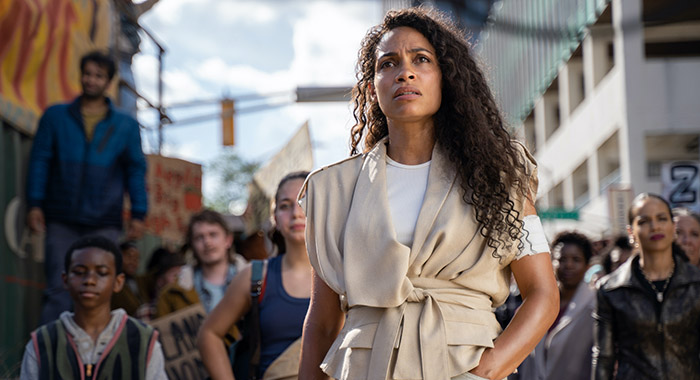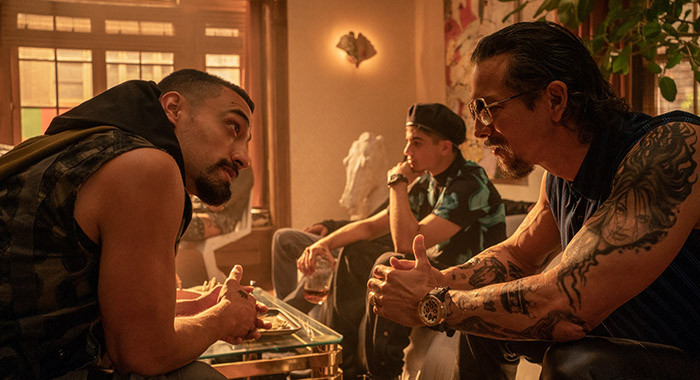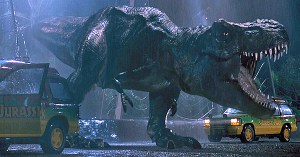DMZ Co-Creator Roberto Patino Discusses Hope in a War-Torn City, Bad Parenting, and ‘The Cycle’
The comic book adaptation stars Rosario Dawson and Benjamin Bratt in a futuristic Manhattan after civil war has split the country.
If you watched HBO Max’s DMZ over the weekend, you saw the complete tale of one woman’s transformation as she searches for her son in a Manhattan caught between sides in a second American Civil War. And though the show reveals some of the brutality involved in that premise, it focuses on Alma (Rosario Dawson), her tenacity, and the hope she actually encounters within the confines of the Manhattan Demilitarized Zone. Executive producer and showrunner Roberto Patino said he wanted to focus on the hope that people find in life, even in a war-torn city, when he spoke with Rotten Tomatoes about the show, its major shift from the story told in the original DMZ comic book — which is more focused n the war itself — and the accountability Alma must face across the four-episode limited series co-created by Ava DuVernay.

(Photo by Richard DuCree/HBO Max)
Erik Amaya For Rotten Tomatoes: Despite the horrific events occurring in and around Manhattan, life goes on eight years later. Was that the thematic mission statement with DMZ?
Roberto Patino: That was at the core of the thesis behind the show and behind wanting to take it on. The comic book was written seventeen years ago and it really presented another idea called a second Civil War. When I took that in, I was like, “This is a crazy concept,” but it was so out there that you could really revel in it. And the comic does revel it. But if you want to explore the it 16 years later, that doesn’t fly. It’s too tender and it’s too degenerative an idea.
So my whole angle in approaching DMZ from the outset has been creating a hopeful story from this. Starting at basically our worst-case scenario, having that have happened, and telling the story of what happens next. It is inherently the story of hope, the story of people coming together, the story of life finding a way, as you see in the first episode with the barter market with Parco’s barbecue. We really wanted to extol disparate walks of humanity coming together as a unit.
Parco (Benjamin Bratt) is such interesting because he is so warm and inviting at that barbecue. And by the end, he’s literally foaming at the mouth. Was there also an intention to deconstruct the notion of the charismatic leader?
Patino: Really, my goal was just to humanize every single person in this show, paint them in as complicated and truthful a light as possible. And for Parco, fundamentally this guy is a father, but he’s also someone who has played by the rules. He’s an immigrant who has worked hard, grew up rough, served his country, but has always felt like a second-class citizen.
And now there’s this war, this DMZ, no rule of law, and he sees that as an opportunity to elevate his station and to ultimately get a seat at the power. For Parco I think there is a certain … I guess, a sense of entitlement, of like, “I deserve this, and I’m the man for this.” So, I think for him, it’s just, he’s so close to attaining that seat at the table that he wants so bad. It’s literally one action away. And [when it crumbles], that’s where he starts foaming at the mouth. But fundamentally, I did want to draw him as much as a relatable human as possible.
It’s also interesting that the series, for the most part, avoids really giving us a lot of what the U.S. or secessionist Free States of America are like at that point, but seeing the way Christian leaves to the FSA and the way Parco is taken away to the U.S., it feels pointed. Was there a definite choice to avoid describing what these nations are like?
Patino: Yes and no. I think you can kind of get the gist of the peripheries of what they’re like. But frankly, I’m just not interested in any sort of divisiveness. The concept of a civil war is incendiary already. You ask 10 different people how we might get to civil war, you’re going to get ten different answers. And I just don’t feel like I personally, as an artist, want to put that out there. That’s why the war happened in the past. And this story looks forward [as the DMZ] reclaims its sense of self and its own land. The vector has broadened out and that was a super-intentional idea, but you get glimmers of the kinds of people at each part, the sort of rigor and formality of the United States versus the sort of grassroots nature of the free states … but I didn’t really care about the story of why [the nations formed as they did].

(Photo by Richard DuCree/HBO Max)
To move from nations to the people of DMZ, that first scene with Alma and Christian (Freddy Miyares) seems to be what could a parent’s second-worst nightmare – being confronted with their shortcomings – but in the next episode Alma literally says seeing what Parco turned Christian into is her worst nightmare. Do the circumstances push that worst-case scenario into a different light?
Patino: I think Alma’s guiding star, the idea that really drives her, ultimately, is accountability. That’s the truth she speaks to the power she finds in the DMZ, which is guns, gold, what have you. She calls a bluff and sides with Wilson (Hoon Lee) with this effort to find her son, but quickly thereafter, she’s realizing that, as Susie (Jade Wu) says, “There are orphans, what are you going to do with these people here? Because you’re accountable to them. You’ve given them hope now.” She is for the first time accountable, and she steps up to that.
So, I think part of her arc has to be reconciling with who she was as a mother, which wasn’t perfect. It’s such a lofty romance idea to be like, “Oh my God, the love of a mother for her son, she’s going driven by that.” But then you realize she didn’t lose him. The kid ran away, because he was scared, because his dad was locked up. He was locked up because of her. And he was locked up because she kept Christian from seeing him and she was very protective, almost smothering.
That’s something that she has to reconcile with. That’s something that’s very difficult because as parents, you only want the best for your kids. You want to do your best. I joke with my wife that the definition of a great parent is someone who screws their kid it up only a little bit. And I think reconciling with that must be very, very tough.
But also, that line that she says to Carmen (Juani Feliz), “I realize that my worst fear is seeing that my son became exactly like my ex,” is such a testament of helplessness. She wasn’t there to intervene, right? He was left alone all these years with Parco, and Parco reformed him into a soldier at war, which was his own demented form of fathering, his own way to imbue his son with power because all you want for your kids is for them to be okay, right? We are now at a time of war, got to become a soldier, got to get power. That’s the currency you need, right? That was Parco’s ethos. And as a single parent, Alma is reeling from her inability to have a voice in his formation there.
Halfway through, Susie (Jade Wu) declares “the cycle is the cycle” when she sizes up Alma. It feels so pivotal as it could be a statement of despair, but she seems to use it more as a way to question the paradigm. How do you look at that phrase and how the viewer might take it?
Patino: I think from Susie’s point of view at that moment, she’s been through it all, she fought in her own revolution, she has seen the rise and fall of leaders, and her faith in humanity has been dashed, right? But she sees Alma’s power, she sees the way that she’s incited these people to hope. And I think in that moment, she’s saying it from where she’s at personally and emotionally — “Look, this is where I’m at. I’m an old lady. We’re not going to change the world. Humanity is what it is. We’re trapped by our own impulses.”
But I think she’s trying to incite Rosario’s character, Alma, to buck that. At the end of that episode, Alma echoes that phrase, “the cycle is the cycle,” when she sees what Wilson actually is. And it works, she rises above, she takes that sort of mantra and aims to break it, and not to get too lofty, but that’s what we see in history.
You go back to tenth grade history and it’s the story of wars, treaties that ended wars, players in wars, their subsequent rule of power and a new war, right? That is the cycle and that’s what we’re taught. It’s definitely very guided history, but very few of those stories involve women and women in power and true diplomacy, which I think is an inherently female superpower: the ability to talk things through without getting heated, without wanting to push the red button. So, I think Susie there is trying to inspire Alma to basically hold her to account for the things she’s already laid in motion and get her to step up. And, ultimately, it works.







